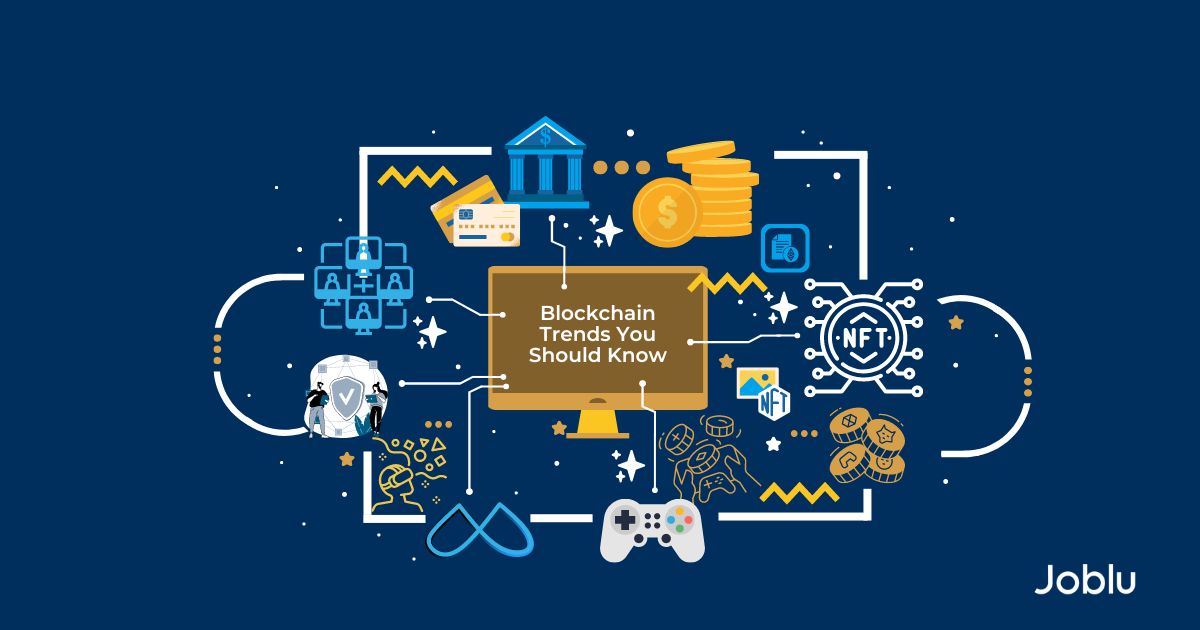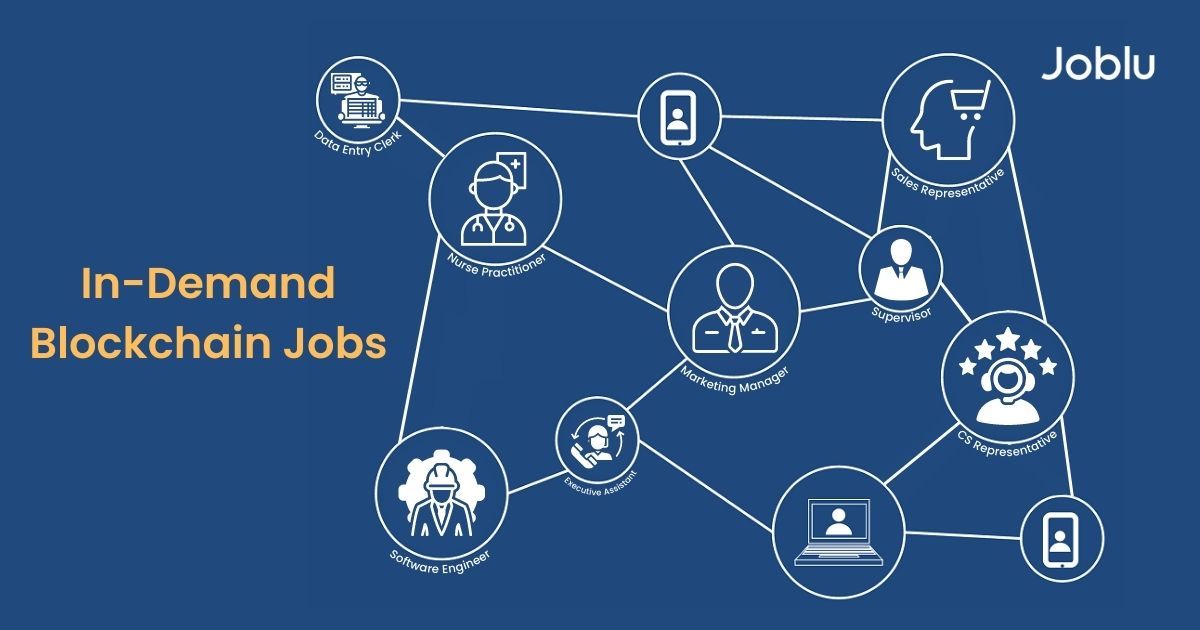Of all the emerging industries in recent years, it’s fair to say that blockchain technology is the most exciting. It’s such a disruptive technology that can be applied to various important sectors in this digital age. Now, the question is — how exactly do you find blockchain jobs and break into the very new industry?
To answer this question and provide other useful information on job hunting, Joblu partners with schools and institutions all over the world, hosting webinars on how to find meaningful jobs and forge new paths in the workforce. In a recent event with the Singapore Institute of Management (SIM), Joblu Founder and CEO Abhii Dabas zeroed in specifically on the world of blockchain technology and the many exciting opportunities it offers to job-seekers and career-shifters from all backgrounds.
Table of Contents
What is blockchain technology?
Before considering getting into blockchain career opportunities or even blockchain internships, Dabas notes the importance of understanding the basics of the technology. According to him, what makes blockchain technology so exciting is that you don’t need to be a blockchain engineer to find opportunities in the industry. Many major businesses or enterprises rely on data, and blockchain presents “a radically new system that facilitates trustless, transparent, and secure transactions across an open, decentralized network.”
Blockchain explained: A basic definition
Blockchain technology is a new form of database mechanism. It uses blockchain, a shared ledger distributed in a peer-to-peer computer network, as its database for recording transactions and keeping track of assets, whether they’re tangible or intangible.
In blockchain technology, data is stored in blocks instead of tables. When new data comes in, a new block is formed. Once filled, it is closed or set in stone, timestamped, and chained to another block, creating a chain. Because each block is closed when filled, it makes its data storage immutable — meaning, it can no longer be reversed. The data in the block is now permanently recorded and available for anyone on the network to view. This blockchain is not controlled by a single party or group. Instead, everyone on the network has control. Because of the way it is structured, it does not rely on a third party to maintain its security and fidelity.
Elements of blockchain technology
To aid our basic understanding of the technology, here are four key terms of blockchain explained in the simplest terms.
1. Nodes
According to Google Cloud, a node is a device, such as a computer, laptop, or server, that contains a full copy of the blockchain’s transaction history.
2. Mining
Each participant with a node in the blockchain network is responsible for validating blockchain transactions. This type of validation is called mining. Miners keep the blockchain consistent, complete, and inalterable. They’re the ones grouping new data or transactions into blocks. They get incentivized for this responsibility, usually in the form of coins.
3. Block
The most basic package of data in a blockchain — it stores recorded data permanently before being chained to another block, thus creating a blockchain.
4. Consensus Algorithm
Because blockchain is a decentralized system, the validation of its transactions does not rely on a central authority. Instead, the nodes on the network need to agree on its validity. This is done through a mechanism called consensus algorithm.
Getting started in the blockchain industry
In this information age, learning about blockchain technology is open to anybody and everybody who’s interested. Dabas shared that when he started, he didn’t take any special course on technology to familiarize himself with it. Information is readily available online. Watching YouTube videos is one way to get started, though Dabas noted that you shouldn’t limit yourself to those. A method he suggested, which he used himself, is reading white papers. Find the top 10 or 20 blockchain projects in recent years, find out which aspects of blockchain interest you, and then do a deep dive into those subjects.
If you want to dive even deeper, you can look for a blockchain internship so you can have more hands-on and practical experience.
Blockchain trends you should know
While most of us have heard of blockchain technology through the rise of Bitcoin and cryptocurrency, it actually has many use cases in various emerging sectors in our society. To get started in the blockchain industry, consider reading up on these trends.

DAOs or Decentralized Autonomous Organizations
Member-owned with no central authority, fully autonomous and transparent, with blockchain-based rules on a code that is viewable and verifiable by anyone in the org.
NFTs or Non-Fungible Tokens
Tokenizing real-world assets with unique identification codes and metadata — makes buying, selling, and trading more efficient and less prone to fraud.
P2E or Play 2 Earn Games
Players play a game and earn cryptocurrency. The more they play, the more assets they collect. These assets have real-world value.
Metaverse
A shared immersive world where players, represented by avatars, can interact with each other and create experiences and assets together. They can buy, sell, and trade these creations within their intrinsic economy and currency.
DeFi or Decentralized Finance
An emerging financial technology based on distributed ledgers, aiming to remove third parties and centralized institutions from financial transactions.
List of Blockchain Jobs
Career opportunities in blockchain are not limited to crypto jobs or blockchain developer jobs. You can still break into this industry even if you’re not a blockchain engineer.
Take, for example, Bored Apes. Bored Apes, Dabas shared, was started by two guys with no tech background. They simply decided to take their love of gaming to the next level and create an NFT. They devoted their time and effort to building a community around their creation and reaching out to other artists and crypto enthusiasts to collaborate. Because of their hustling, they were able to turn things around and create a 4-billion-dollar company off their NFT creation.
The possibilities of applying blockchain in many fields have yet to be actualized, so there are still many untapped opportunities for anyone interested in the technology. For now, here are some of the most in-demand blockchain jobs available in the job market:

Blockchain developer
Investment analyst
Game designer
Metaverse content creator
Technical copywriter
Application developer
Community manager
P2E specialist
NFT creator
NFT marketplace growth specialist
Solutions architect
Technical project manager
UI/UX designer
Blockchain consultant
Crypto influencer
Crypto fund manager
Crypto PR specialist
Popular blockchain applications
As you can see, blockchain can be applied onto almost every vertical. Many industries can make use of blockchain in their database management. Its most popular usage is finance and currency, but now we can see that it can also be applied to art and content creation. Another popular application is the supply chain. Healthcare can also benefit from the use of blockchain in storing patient data, clinical trials, and more. In retail businesses, blockchain can help manage their inventory more efficiently. Blockchain systems can also improve government systems and processes.
Just as the guys from Bored Apes did, Dabas said, one way to get into the blockchain industry is to think of what you’re interested in. Then ask “Can I combine my passion with blockchain technology and decentralized technology and do something that is very fulfilling, enjoyable, and extremely lucrative?” Another way to go about it is to look around you and see which systems can be improved by the principles of blockchain.
Blockchain technology is indeed the future of tech, with its many applications and exciting features. Because it’s decentralized, anyone can get involved. It offers career opportunities and Web 3 jobs even for those who do not find crypto jobs or blockchain developer jobs within their wheelhouse. Whether you’re a blockchain engineer or not, there’s a blockchain career for you, as long as you’re interested and willing to learn.
Excited to launch a career in blockchain? Sign up for Joblu. Discover a whole new world of exciting opportunities in forward-thinking industries like blockchain and get ready to work anywhere. Find a meaningful job that suits you, with companies you can trust, all with just a few swipes.
Frequently Asked Questions About Blockchain Jobs
Q: What jobs are available in blockchain?
A: The most sought-after Web 3 jobs in blockchain are crypto jobs or blockchain developer jobs. If you don’t fit in any of these categories, one of these might suit you:
- Investment analyst
- Game designer
- metaverse content creator
- Technical copywriter
- Application developer
- Community manager
- P2E specialist
- NFT creator
- NFT marketplace growth specialist
- Solutions architect
- Technical project manager
- UI/UX designer
- Blockchain consultant
- Crypto influencer
- Crypto fund manager
- Crypto PR specialist
Q: Is blockchain a good career?
Yes. Its diverse application means you can come into it from any background. And as many industries are still in the early stages of applying the technology, you can even be one of the pioneers.
Q: Is blockchain difficult to learn?
It’s a new concept for most of us, so it can be quite intimidating to learn. However, there’s no shortage of information online so it’s easy to get access to them if you’re willing to look. If you want to do a deeper dive, getting a blockchain internship or enrolling in a certificate course should be enough to get you started.
Q: How do I start a career in blockchain?
There’s no hard and fast rule to finding blockchain career opportunities. Some create their own opportunities, others get internships, while some take advanced or certificate courses to qualify.
Q: Does blockchain require coding?
If you’re looking for blockchain developer jobs, then yes, coding is required. Knowledge of data structures, web development, and basic or mainstream programming languages are good skills to have to get started as a blockchain developer.